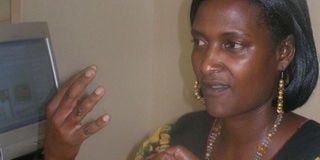Deaf and dumb but an efficient receptionist

Appy Namatovu Ssempala at her workplace at the NUDIPU offices in Kampala. Photo by Sarah Tumwebaze
Appy Namatovu Ssempala walks gracefully to her seat at the front desk of the offices of the National Union for Disabled Persons. She signals to visitors and asks how she may be of help and later gives directions to the right officers.
She, however, does all these by writing. One only realises her disability when the phone rings. She walks to the back and signals one of her workmates to come and help.
“The phone gives a red light, that is how she gets to know a person is calling,” says a colleague. “When people come to office, I welcome them with a smile, gesture to them to have a seat. When they sit, I gesture that I cannot hear. At times some of them do not understand what I am trying to communicate. In such cases, if my interpreter happens to be around, she helps. But when she is away, I will communicate with the person through writing. I always have a paper and pen which come in handy during such moments,” she says.
Namatovu, who has worked as a receptionist for three years now, says she has never experienced any kind of negative attitude from work-mates or visitors. Instead people get amazed by the fact that a blind and deaf person is a receptionist. “Most of the people that come here are either disabled or they know that they are coming to a place for people with disabilities,” she says.
Namatovu says the only challenge she faced was her limited knowledge on how to operate a computer and filing. “But when I went back to school, I got the necessary knowledge which helped make my work easier.” “My bosses are happy with the work I am doing and that’s why they entrusted me with the front desk,” she adds.
Her interpreter, Milly Nambolanyi, is an employee at NUDIPU and she is paid by the company. Through her interpreter, Namatovu says her current condition started as a hearing problem at the age of 19.
“I had a hearing problem but it was not that serious though I was uncomfortable having to strain to hear what people were saying. So in my Senior Four, my parents took me to one of the prominent hospitals here in Kampala for a checkup,” she says. “After the checkup, the doctor told me that a certain tube in my ear was blocked and thus I had to be operated.”
However, her condition worsened after the operation and a further medical checkup confirmed her worst fears- that she would never be able to hear again. “He told me that a part of my brain had been damaged before the operation. He even advised that I do not go back to school because reading would over strain my brain and might lead to brain damage,” Namatovu adds.
With the doctor’s advice, Namatovu stayed at home for a year and during this time, speech too became a problem. In 1990, her parents took her to Mulago Hospital for more tests because by then, she could neither hear nor talk.
At Mulago, the doctor told her that her eardrum had been damaged during the operation and could not be restored. “He even told me that the damage on my eardrum had also affected my speech. I was very mad but the doctor calmed me down and recommended that my parents take me to the school of the deaf so that I could learn sign language.”
However, by then, the school of the deaf in Ntinda, Kampala had just opened and it only had classes up to Primary Four and Namatovu felt that she was too old for the class. So with the help of the doctor at Mulago, Namatovu joined NUDIPU which connected her to the Uganda National Association of the Deaf (UNAD).
She also enrolled at YMCA, Kampala, for a tailoring course. But her time at YMCA was not a bed of roses.
Facing hurdles
“I think I was the first deaf and dumb person students at YMCA had seen. Besides the unnecessary attention I was getting from them, I had a hard time learning what the teacher was saying. By then I did not know any sign language and neither did any of my teachers. So I only depended on lip reading which I was not good at.” For better results, her parents had to pay teachers to give her individual lessons so that she could understand whatever she had missed in class.
After the course, she got a tailoring stall on Kampala Road where she worked for seven years. Her condition was a blessing in some way because it earned her popularity.
In 1998, she contested for the position of local council III representative for people with disabilities in Rubaga Division and won. After serving her term, she applied for the job of a logistics assistant at NUDIPU.
“I got the job but because I was not good at computer, I went for a compute course at Makerere University and another course in management and filing at Nakawa. With these skills, I was a logistics assistant at NUDIPU for 10 years.” Basing on her experience and ability to communicate to people with all kinds of disability, she was asked to work as the office (front desk) assistant and she is holding that position to date.




